9 start with O start with O
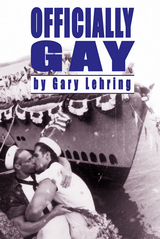
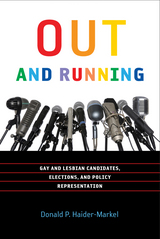
Out and Running is the first systematic analysis of lesbian, gay, bisexual, and transgender (LGBT) political representation that explores the dynamics of state legislative campaigns and the influence of lesbian and gay legislators in the state policymaking process. By examining state legislative elections from 1992 to 2006 and state policymaking from 1992 to 2009, Donald Haider-Markel suggests that the LGBT community can overcome hurdles and win elections; and, once in office, these officials can play a critical role in the policy representation of the community.
However, he also discovers that there are limits to where and when LGBT candidates can run for office and that, while their presence in office often enhances policy representation, it can also create backlash. But even with some of these negative consequences, Out and Running provides compelling evidence that gays and lesbians are more likely to see beneficial legislation pass by increasing the number of LGBT state legislators. Indeed, grassroots politics in the states may allow the LGBT community its best opportunity for achieving its policy goals.
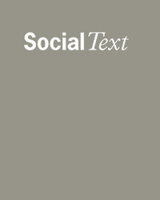
In their examinations of worker and gay rights, the scholars, artists, and activists who speak in this volume argue that neither the labor movement nor the gay rights movement will make substantial progress without a deeper understanding of the connections between identity politics and class. Included is a major policy statement by AFL-CIO president John J. Sweeney. Four other labor leaders—Bill Fletcher Jr., Yvette Hererra, Gloria Johnson, and Van Allen Sheets—discuss homophobia as “labor’s new frontier.” Nikhil Pal Singh’s conversation with lesbian activist Amber Hollibaugh and a virtuoso piece by filmmaker Tami Gold offer incisive personal histories and commentaries, which Cathy J. Cohen takes the mainstream gay and lesbian movement to task for not adequately or consistently focusing on issues of class.
Contributors. Cathy J. Cohen, Bill Fletcher Jr., Tami Gold, Yvette Herrera, Amber Hollibaugh, Gloria Johnson, Kitty Krupat, Patrick McCreery, Van Allen Sheets, Nikhal Pal Singh, John J. Sweeney
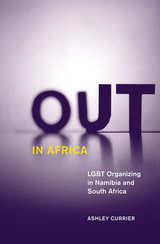
Visibility matters to activists—to their social and political relevance, their credibility, their influence. But invisibility matters, too, in times of political hostility or internal crisis. Out in Africa is the first to present an intimate look at how Namibian and South African lesbian, gay, bisexual, and transgender (LGBT) organizations have cultivated visibility and invisibility as strategies over time. As such, it reveals the complexities of the LGBT movements in both countries as these organizations make use of Western terminology and notions of identity to gain funding even as they work to counter the perception that they are “un-African.”
Different sociopolitical conditions in Namibia and South Africa affected how activists in each country campaigned for LGBT rights between 1995 and 2006. Focusing on this period, Ashley Currier shows how, in Namibia, LGBT activists struggled against ruling party leaders’ homophobic rhetoric and how, at the same time, black LGBT citizens of South Africa, though enjoying constitutional protections, greater visibility, and heightened activism, nonetheless confronted homophobic violence because of their gender and sexual nonconformity.
As it tells the story of the evolving political landscape in postapartheid Namibia and South Africa, Out in Africa situates these countries’ movements in relation to developments in pan-African LGBT organizing and offers broader insights into visibility as a social movement strategy rather than simply as a static accomplishment or outcome of political organizing.
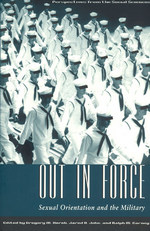
Both sides base their views on assumptions about the consequences of integration. Even defenders of the ban grudgingly acknowledge that homosexuals are fully capable of serving with distinction. Few question gay service members' abilities or patriotism; justifications for the ban are now predicated on heterosexuals' negative reactions.
Out in Force refutes the notions that homosexuality is incompatible with military service and that gay personnel would undermine order and discipline. Leading social science scholars of sexual orientation and the military offer reasoned and comprehensive discussions about military organizations, human sexuality, and attitudes toward individuals and groups. They demonstrate forcefully that the debate is really about the military as an institution, and how that institution will adapt to larger social changes. The contributors show that the ban could be successfully eliminated, and set forth a program for implementation. In sorting opinion from fact, myth from reality, Out in Force stands as an invaluable guide for the military, lawmakers, and the courts as they continue to grapple with this question of institutional and societal change.
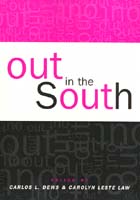
Out in the South is organized into sections that focus on a central metaphor of space and location. This grounds the book in the sense of the South as a special region and in the inside/outside dilemma faced by many gay and lesbian Southerners as they negotiate their place in an often-inhospitable homeland.
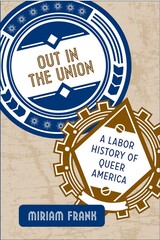
Out in the Union tells the continuous story of queer American workers from the mid-1960s through 2013. Miriam Frank shrewdly chronicles the evolution of labor politics with queer activism and identity formation, showing how unions began affirming the rights of lesbian, gay, bisexual, and transgender workers in the 1970s and 1980s. She documents coming out on the job and in the union as well as issues of discrimination and harassment, and the creation of alliances between unions and LGBT communities.
Featuring in-depth interviews with LGBT and labor activists, Frank provides an inclusive history of the convergence of labor and LGBT interests. She carefully details how queer caucuses in local unions introduced domestic partner benefits and union-based AIDS education for health care workers-innovations that have been influential across the U.S. workforce. Out in the Union also examines organizing drives at queer workplaces, campaigns for marriage equality, and other gay civil rights issues to show the enduring power of LGBT workers.
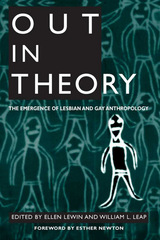
This compelling collection of essays details the scholarly and personal factors that affected the emergence of lesbian and gay anthropology and speculates on the directions it will take as it continues to grow and diversify. Seeking to legitimize the field's scholarship and address issues in terminology, the essays also define the lesbian and gay anthropology's scope and subject matter and locate factors that separate it from the wider concerns of the profession.
Specific essays track the emergence of lesbian and gay studies in social and cultural anthropology, linguistics, archaeology, and in various areas of anthropological activism. They also consider how feminist anthropology helped define the field and how transgendered experience, queer theory, and race and class studies are promoting new directions of inquiry within lesbian and gay anthropology.
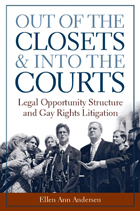
Out of the Closets and into the Courts explores both the promise and the limits of using legal mobilization to effect social change. Crossing disciplinary boundaries, Ellen Andersen draws on the accumulated knowledge of political science, law, and sociology to explain the origins and outcomes of gay rights litigation. The resulting book is essential reading for anyone interested in gay rights, legal change, and social movements.
READERS
Browse our collection.
PUBLISHERS
See BiblioVault's publisher services.
STUDENT SERVICES
Files for college accessibility offices.
UChicago Accessibility Resources
home | accessibility | search | about | contact us
BiblioVault ® 2001 - 2024
The University of Chicago Press









